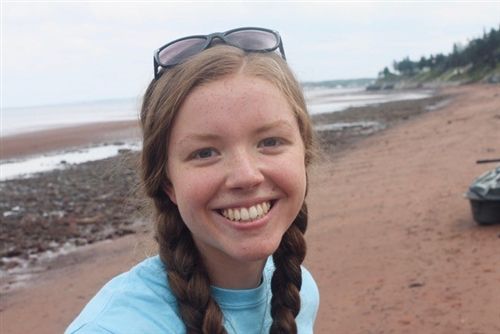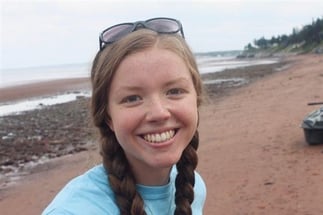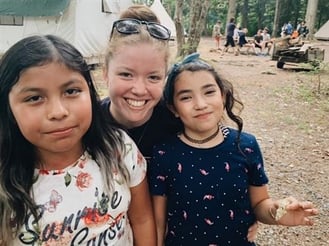Inside King's-Edgehill School

Alumni on the Frontline Against COVID-19: Sophie Fraser
When Sophie Fraser (2014-19) graduated last June, the trajectory of her life seemed clear. Having always excelled in the sciences, Sophie received her high school diploma having been accepted to the Queen’s University Bachelor of Engineering program, one of the foremost in the country. Excited for her post-KES journey, she was also considering a future career in medicine having already realized her interest in emergency medicine and oncology.
Unfortunately, shortly after graduation, life threw Sophie a curveball that put her plans on hold. She was hospitalized for several months after being diagnosed with Guillain-Barré Syndrome, “a rare disorder in which your body’s immune system attacks your nerves” (per the Mayo Clinic). Even as her symptoms eased and became more manageable, Sophie faced months of physical rehabilitation that forced her to defer her first year at Queen’s.


Rather than taking the whole year off, however, after she recovered Sophie decided to get a (several year) jump-start on her medical career. In February this year, she applied to work as a Research Assistant for the Division of Infectious Diseases at the Nova Scotia Health Authority (NSHA) when the spread of COVID-19 in Canada was in its early stages. Using her resume bursting with admirable achievement, of which she highlights her time as the Regimental Sergeant Major in KES’s 254 Cadet Corps in 2019 as a particular point of pride, she was able to secure a position as a Research Assistant on the NSHA’s Clinical and Medical Advisory Committee (CMAC). In early March, when Sophie was hired, Dr. Shelly McNeil—the division head, service chief, and research director for the NSHA’s Division of Infectious Diseases, and the team lead of CMAC—had just received funding to research COVID-19 at the NSHA Pandemic Emergency Operations Centre. Since then, CMAC has been working closely with the NSHA Infection Prevention and Control (IPAC) on COVID-19 research. In Sophie’s own words:


“We are working […] to develop evidence-based recommendations and policies for the management of patients with confirmed or suspected COVID-19 in order to ensure optimal safety of healthcare workers and patients. We also work with clinical teams across the NSHA to create and refine clinical care pathways for COVID-19 patients. These pathways include all the possible routes that COVID-19 patients, suspected COVID-19 patients, non-COVID-19 patients, or anyone in between might take when they present with a health problem during the pandemic. These pathways dictate the course of action: treatment, stay duration, discharge criteria, etc.”

The team has been critical to the timely dissemination of up-to-date information about COVID-19 across Nova Scotia’s four geographic healthcare management zones during the pandemic. They have been working tirelessly to ensure the whole of the NSHA remains comprehensively informed and adequately prepared as understanding of the virus evolves and best practices change. In particular, Sophie has been working on the development of research and treatment protocols:
“One of my tasks has been to assist with the development of materials to be used in a large, province-wide COVID-19 treatment trial that will make promising and novel treatment options available to Nova Scotians with COVID-19.”
Talking about what it’s been like working on such vital research, Sophie tells me that she feels grateful to have the opportunity to be involved in the pandemic relief efforts, and to be working with “such phenomenal and intelligent people on a daily basis.” Having only started her job last month—though March did feel extraordinarily long for many of us—Sophie says she has learned more than she “could have ever imagined” about medical research over such a brief period. I ask Sophie if this opportunity has made her consider specializing in infectious disease with her future medical studies, and she tells me that she is open to a number of different medical career paths, but that the study of infectious diseases is definitely one that has captured her interest. Indeed, as I have to remind myself, despite the gravity of her current role Sophie still has many years left to make such a decision.


I also ask Sophie how she is managing the day-to-day stress of being an essential worker at a time when the rest of us have been sternly advised to “stay the blazes home.” She tells me that she has been ensuring she takes a bit of time to herself each day, highlighting morning runs as her favourite self-care ritual. Sophie also tells me the ways in which her time at KES helped prepare her to face times of stress and adversity, and how the School helped her understand the importance of maintaining a sense of community throughout them:
“Although these times are unknown and stressful, it is not something that we cannot handle. KES has given us all the tools necessary to face this pandemic together and demonstrate the virtues of strength and community during times of hardship.”
For the KES students who are facing a challenge similar to Sophie’s right now—having to remain productive during an unprecedented and stressful time—she reiterates the importance of self-care. While for her that means a morning workout, she acknowledges it can look different for everyone—whether it is meditation, reading a book, or doing puzzles—but that it’s just important to make sure you find time for yourself.
As someone working firsthand with the deadly consequences of the spread of COVID-19, Sophie also makes sure to mention how imperative it is that we continue to follow the recommendations of our health authorities:
“That is your greatest responsibility at this time, and the decisions you make will have a true impact on the outcomes that we see in our future and in the health and safety of those around us.”







